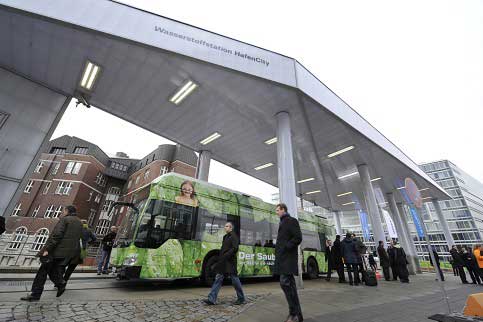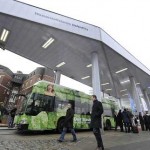
 The continuous rising prices of fuel have led many to try out alternative renewable energy sources.
The continuous rising prices of fuel have led many to try out alternative renewable energy sources.
One of the fast emerging alternative fuels is hydrogen. Now researchers and designers come up with new concepts for cars two wheelers and adaptive devices to help cars running on hydrogen. The biggest issue for the hydrogen fuelled cars is to recharge them. These kinds of hydrogen fuelled cars are expensive and the lack of charging stations ads a little bit frustration for owners.
Following the idea the city of Hamburg, in Germany, has opened what is billed to be Europe’s biggest hydrogen refuelling station in HafenCity. As the announcement, the Vattenfall Company is the supplier for the station’s energy, which is capable of delivering up to 750 kg of hydrogen every day. The refuelling station, which opened in February 17 this year, will not only cater to cars running on hydrogen, but will also deliver fuel to 20 fuel cell buses being operated by Hamburger Hochbahn, the city’s public transport authority.
The station was constructed at a cost of 10 million Euros, shared by the Federal Ministry of Transport and Vattenfall. Since 2003, the power company and Hamburger Hochbahn have been cooperating to establish hydrogen refuelling stations for buses. This latest endeavour is part of an ongoing process, which may soon see a majority of the city of Hamburg relying on hydrogen fuel for transportation in the future.
HafenCity’s refuelling station produces half the hydrogen on site through electrolysis with the other half delivered. The venture is part of Germany’s Clean Energy Partnership (CEP) organization, which sees companies attempting to incorporate hydrogen into automobile manufacture in order to help reduce carbon emissions from vehicular traffic. Vattenfall has been a key player in the CEP, cooperating with industry players to help set up charging stations in Berlin, promoting battery electric vehicles with BMW, and plug in hybrid electric cars with Volvo Cars.
Growing fuel costs and limited supply have forced countries to find sources of alternative fuels to an ever growing urbanized world and increasing population. While the cost of building hydrogen fuelled cars and setting up refuelling stations isn’t cheap, we’re left with only a few alternatives to ensure our survival. Today, automakers, electronics companies and energy corporations are investing more money for the production of green energy than they’ve done in past years. Such efforts also help to scale down dependence on other oil producing countries, giving them a higher sense of independence.



